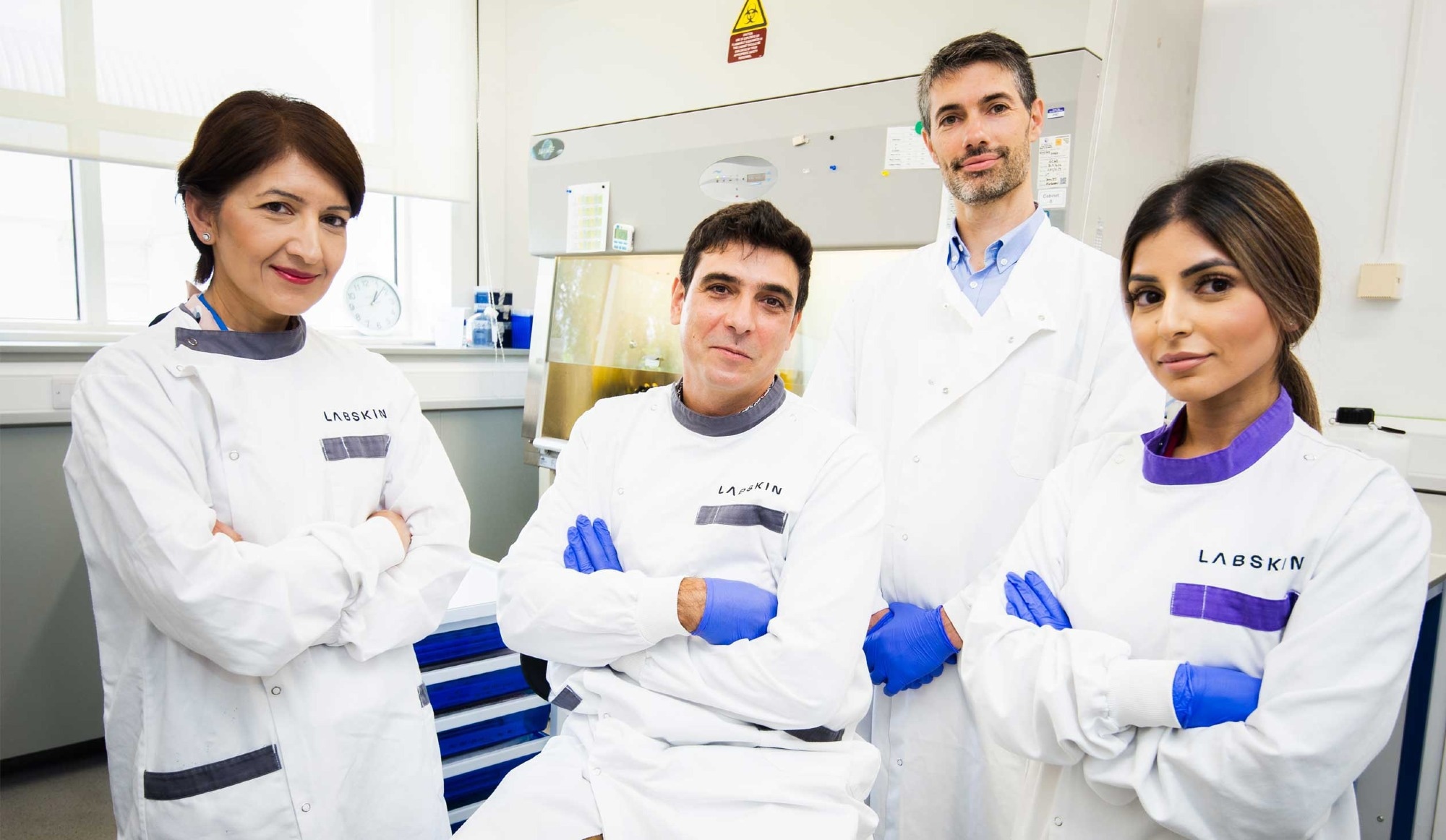Reviewed by Maria OsipovaSep 27 2022
Labskin and University of Bradford team up to bring new science in skin health to greater diversity for skin types.
 Pictured below from left to right: Dr Sobia Kauser, Assistant Professor University of Bradford, Dr. David Caballero-Lima, Chief Scientist Labskin, Dr. Jacobo Elies Gomez, Assistant Professor, University of Bradford, Dr. Omera Bi, Labskin
Pictured below from left to right: Dr Sobia Kauser, Assistant Professor University of Bradford, Dr. David Caballero-Lima, Chief Scientist Labskin, Dr. Jacobo Elies Gomez, Assistant Professor, University of Bradford, Dr. Omera Bi, Labskin
In a major breakthrough for research into skin health and the development of skincare products, UK-based Labskin and the University of Bradford’s Centre for Skin Sciences today announce that the first-ever commercially available lab-grown ‘pigmented’ skin-equivalent has been developed. In a joint project, scientists have been able to incorporate melanocytes – the cells that give skin its pigment – into Labskin’s full thickness human skin models that naturally mimic the skin’s microbiome.
Labskin is the pioneer in the development of laboratory grown human skin equivalents. The world’s leading consumer health and skincare companies use Labskin and its artificial intelligence-driven data analytics for research and testing the efficacy and impact of skin care product formulations on the skin microbiome. Labskin has conducted thousands of tests on skin care products, cosmetics, health care, drug delivery and wound care.
Several scientific publications have demonstrated that skin of different ethnicities present different microbiomes. These new ‘pigmented’ models incorporating melanocytes allow Labskin to further assess safety and efficacy of skincare ingredients and formulations on a greater diversity of skin types, integrating ethnic skin with various microbiomes. The presence of melanocytes on the skin model also permits the study of causes and alleviation of hyperpigmentation, creates an ideal model to study UV exposure response and phototoxicity, and opens the door to establish reproducible melanoma models for the pharmaceutical industry.
Labskin M
Known as ‘Labskin M’ the new, commercially available ‘pigmented’ skin model is a result of the Knowledge Transfer Project (KTP), a UK government program established to encourage collaboration between business and universities. Funding was provided by Labskin and Innovate UK), which provides support to organizations to make new products and services.
Dr Jacobo Elies Gomez, Academic supervisor and Assistant Professor in pharmacology in the Faculty of Life Sciences at the University of Bradford said: “Labskin M represents a state-of-the-art organotypic model for the investigation of the biology and cellular behaviour of melanocytes in health and disease”… “There is no other commercially available system of lab-grown skin that includes melanocytes. This opens up huge opportunities for research and could lead to new discoveries, for example with skin cancers. Being able to offer this commercially makes it much easier for other sectors to become involved.”
This new model is allowing us and our clients to get a deeper understanding about melanin production in healthy and pathological stages, skin toxicology, drug metabolism and the host microbe interaction. It’s a critical development for the cosmetics and dermatological sectors to provide even more precise testing platforms to deliver first class, safe and efficacious products.”
Dr David Caballero-Lima, Chief Scientist, Labskin
Prof Julie Thornton, director of the Centre for Skin Sciences, added: “Our work with Labskin is really leading the way in new cutting-edge technology for human skin biology and the skin microbiome, with the advancement of superior ex vivo human skin models. Labskin M is a major development for the industry and one we’re very excited about.”
Dr Omera Bi, Post Doctoral Scientist and KTP associate who played a significant role in the project said: “ This is the first time melanocytes have been incorporated into a 3D skin cell equivalent. I am excited about the developments Labskin M will be able to make to the industry and it is a great privilege to be part of a it.”